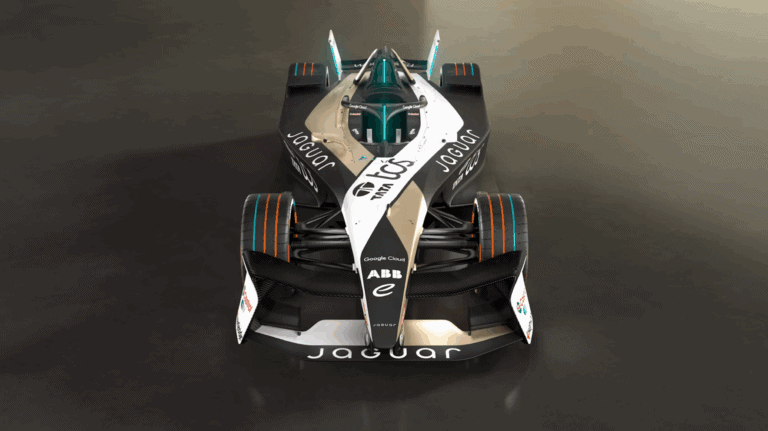The world of Formula E combines technology and speed with sustainability. It’s a blend that Tata Consultancy Services (TCS) finds appealing. Together with Jaguar, it has been competing for the championship for years. What does this mean for TCS (and its customers)?
We are present at the Monaco ePrix, one of the most talked-about races on the Formula E calendar. As usual, the sport takes place in the city center, between temporary crash barriers and pit walls. But despite the physically impressive locations and races, this sporting contest is largely fought out in a virtual domain. That is precisely where TCS plays an important role for the Jaguar team, of which it is the title sponsor.
Faster, smaller, more virtual
We visited TCS in this context before, back in London in 2023. At the time, we learned all about the racing team’s driver-in-the-loop simulator. Nowadays, Nick Cassidy and teammate Mitch Evans regularly take to the virtual track in their Formula E car’s digital twin, dissecting 3D-scanned circuits in preparation for the real deal. Together with their team, the drivers try out all kinds of settings and find the ideal racing line before hitting the track in real life on Saturday and Sunday.
However, TCS Jaguar has now come up with something new: a driver-out-of-the-loop simulation. These days, the team don’t want to rely solely on Cassidy, Evans, and the test drivers. Instead, there’s also an AI-driven digital twins that can do their laps without needing to sleep or eat. Team boss James Barclay and driver Cassidy are very enthusiastic about the move. They tell us it couldn’t have been accomplished without TCS. The project took roughly 18 months to realize, so it’s not something the competition can easily copy.
A TCS data scientist is always embedded within the Jaguar racing team. The company also provides the technology needed to build and maintain the digital twins, while delivering real-time insights during races. All of this is largely cloud-based (on Google Cloud, another sponsor of the team), perfect for responding to the global nature of the sport.
Finding balance
Ashish Babu, Chief Marketing Officer at TCS, sees Formula E as the perfect testing ground for his company to tackle today’s challenges. After all, FE cars must go as far and as fast as possible on the smallest possible battery, with just one charging session during the race. While the cars are physically identical in terms of chassis and aerodynamics, teams make the difference through batteries, powertrains, and preparation.
For TCS, this partnership also offers a chance to discuss the future. Regular cars will eventually have to move away from gasoline entirely. This means using power sources as efficiently and sustainably as possible, since weight, range, and efficiency increasingly determine a vehicle’s usefulness.
Brands are also increasingly relying on software, which already dominates Formula E. Normally, this is a backend business matter, Babu explains. Here, software determines who leads the pack: real-time insights about consumption, strategies, and wear are crucial. All of this must be filtered down to the driver. That’s where technology meets humanity; even the best data is only useful if it’s communicated effectively.
Reliability over innovation
Dr. Kay Müller Jones, Managing Partner and Head of Consulting at TCS, emphasizes that there actually “isn’t that much AI behind” TCS’s Formula E work. Reliability comes first here: the software must be proven and deliver deterministic results. They have no use for ChatGPT or other GenAI tools. The team is therefore very careful about where they deploy AI. This mainly happens in the Virtual Validation model to run stress tests and crash tests with proven results, and of course for the virtual driver. Still, we shouldn’t expect too much consciousness or reasoning ability from this digital twin. It simulates human behavior, but not through human considerations.
The correlation between theory and practice is essential for this, but it’s also a challenging process built on years of experience. That virtual preparation is what Dr. Müller Jones calls the “secret sauce” of this competition. It allows teams to run through countless scenarios before the cars even hit the track.
Dr. Müller Jones acknowledges that in practice, the driver is like a CEO—the ultimate decision-maker. The team must therefore give him what they call “actionable insights,” not an overwhelming data stream. Communication between driver and team during the race must focus on the essentials, as the filtered result of all that preparation. There are simply too many parameters for any individual to make independent decisions about strategies and car settings.
The long term
Reliability is central to TCS’s philosophy, not just in motorsport but across all sectors where the company operates. Dr. Müller Jones insists that the technology they deliver must perform under all circumstances. This requires continuous optimization of algorithms, driven by the vast amounts of data that become available. “But how do you combine it all? That’s the fascinating part,” says Dr. Müller Jones.
While Formula E doesn’t use over-the-air updates like the consumer market, the philosophy behind it is definitely present. “You spend much longer validating the software than building it,” he explains. This thorough validation process is crucial to ensure the reliability needed in the fast-paced environment of motorsport.
For TCS, Formula E represents more than just a marketing investment, it’s a long-term commitment. It’s a proving ground where advanced technologies are tested under extreme conditions, with lessons that extend far beyond the racing world.
